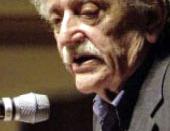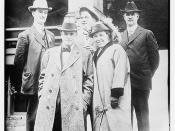Topic: In Slaughter House-5, Kurt Vonnegut accepts the theme that war is inevitable, but emphasizes the fallacy in the masses preconceived notions of war with parallels and motifs, instead of just reaching a practical conclusion about the occurrence of war.
Many books relating to war and its prevention have been written across time. The success of such works' ringing anti-war statements can be questioned since wars continue to happen despite these wise words from philosophers and authors alike. Instead, an examination of war and its affects on the masses will help generate a more meaningful message as opposed to a simple development of which enemy to blame the war on. In Slaughter House-5, Kurt Vonnegut accepts the theme that war is inevitable, but emphasizes the fallacy in the masses preconceived notions of war with parallels and motifs, instead of just reaching a practical conclusion about the occurrence of war.
Vonnegut interlaces his theme of the inevitability of war with religious motifs and the Tralfamadorian sub story. First, Vonnegut emphasizes the prayer in its full length written out twice throughout the book. Billy pilgrim kept a copy in his optometry office and Montana Wildhack had it written on her locket. The prayer stresses the ability to recognize when things are unchangeable and attempt to change them only when possible. But contrary to the prayer, Vonnegut replies with his belief in man's lack of free will through Billy's character. "Among the things that Billy couldn't change were the past, present, and future" (60). Despite knowing about the impending air raids, one expects Billy to act the hero and attempt to forewarn the world. But Billy is content with the fact that nothing he can do will prevent the occurrence of an already structured moment. The basis of Billy's ideals comes...


